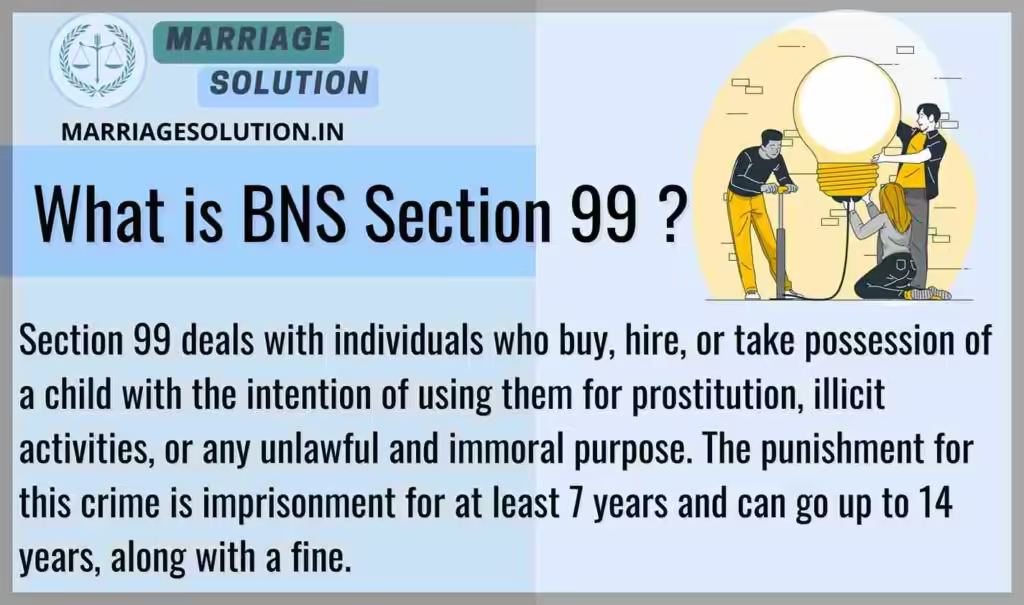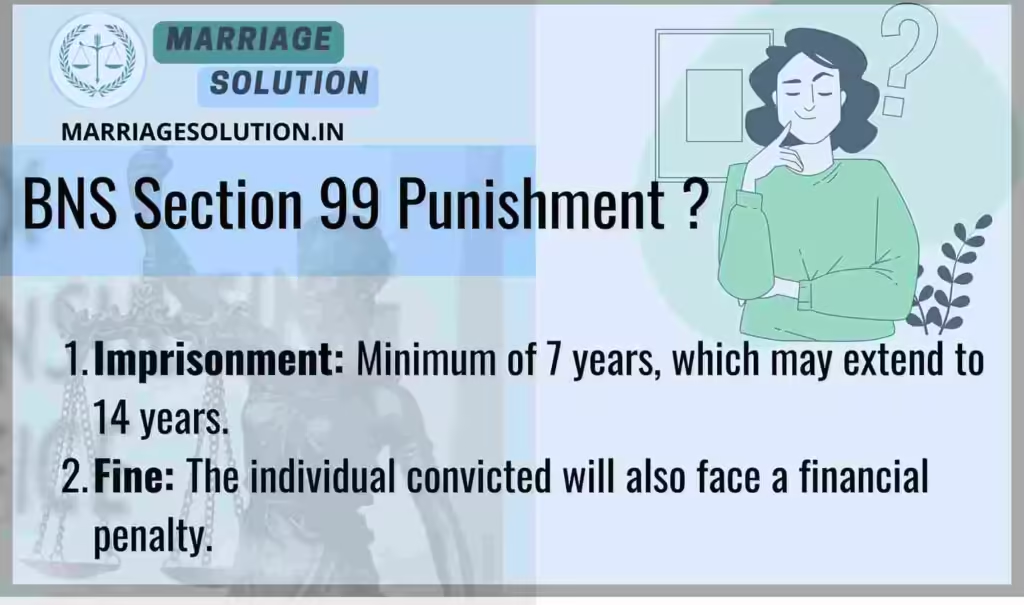Introduction of Section 99 BNS
Section 99 BNS, Child trafficking and exploitation are among the most heinous crimes in society. Section 99 of the Bharatiya Nyaya Sanhita (BNS), 2023, addresses this issue directly by criminalizing the buying, hiring, or obtaining of children for prostitution, immoral activities, or illicit intercourse.
With punishments ranging from 7 to 14 years of imprisonment plus fines, this law ensures strict accountability for offenders. Importantly, it also creates a presumption of guilt against brothel keepers who obtain girls under 18, making it harder for traffickers to escape justice.
By replacing IPC Section 373, Section 99 modernizes and strengthens India’s legal framework with a gender-neutral approach, protecting both boys and girls under 18.
The Bharatiya Nyaya Sanhita (BNS) Section 99 replaces the old Indian Penal Code (IPC) Section 373.
- Introduction of Section 99 BNS
- The Bharatiya Nyaya Sanhita (BNS) Section 99 replaces the old Indian Penal Code (IPC) Section 373.
- What is section 99 of BNS ?
- Bare Act – BNS Section 99
- Illustrations (Examples)
- Section 99 BNS Overview
- BNS 99 Punishment
- BNS 99 bailable or not ?
- Bharatiya Nyaya Sanhita Section 99
- Comparison Table – BNS Section 99 vs IPC Section 373
- BNS Section 99 FAQs
- Conclusion
- Need Legal Support?
What is section 99 of BNS ?
Section 99 deals with individuals who buy, hire, or take possession of a child with the intention of using them for prostitution, illicit activities, or any unlawful and immoral purpose. The punishment for this crime is imprisonment for at least 7 years and can go up to 14 years, along with a fine.

BNS 99 Act
Whoever buys, hires or otherwise obtains possession of any person under the age of eighteen years with intent that such person shall be employed or used for the purpose of prostitution, or for any unlawful and immoral purpose, or knowing it to be likely that such person will be so employed or used, shall be punished with imprisonment of either description for a term which shall not be less than seven years but which may extend to fourteen years, and shall also be liable to fine.
Explanation: When a female under the age of eighteen years is bought, hired, or otherwise obtained for a prostitute or for any person who keeps or manages a brothel, the law presumes—unless proved otherwise—that she was obtained for prostitution.”
- Who can be punished?
Any person—traffickers, brothel keepers, pimps, relatives, or strangers—who buys, hires, or takes custody of a child under 18 with the intention of using them for immoral or illegal activities. - Age Limit
This law protects all minors under 18. Unlike older IPC provisions that focused mainly on girls, Section 99 BNS is gender-neutral—it applies to both boys and girls. - Key Element – Intent or Knowledge
- If the offender intends to use the child for prostitution or immoral purposes → guilty.
- If the offender knows it is likely the child will be used for such purposes → guilty even without direct intent.
- Special Presumption for Girls under 18
If a girl below 18 is obtained and placed in a brothel, the law automatically presumes the purpose was prostitution. The accused must prove otherwise. This shifts the burden of proof to protect vulnerable minors. - Definition of “Illicit Intercourse”
Refers to sexual relations outside of legal marriage or union. Any commercial sexual exploitation of minors falls within this meaning. - Punishment
- Minimum imprisonment: 7 years
- Maximum imprisonment: 14 years
- Fine: Additional financial penalty as decided by the court
This strict minimum ensures no leniency is shown to traffickers or exploiters.
- Why this law is important
Section 99 attacks the demand side of trafficking—the buyers, hirers, and brothel owners who create markets for child exploitation. By punishing them, the law discourages the exploitation cycle.
Legal Nature of the Offense
- Cognizable: Police can arrest without a warrant.
- Non-bailable: Bail is not a right; it can only be granted by the court.
- Non-compoundable: The case cannot be privately settled between the accused and victim.
- Triable by: Court of Session (higher criminal court).
Who Can Be Punished?
- Traffickers and pimps – those who sell or transfer children.
- Brothel keepers/managers – especially if underage girls are obtained.
- Relatives or strangers – anyone involved in transferring a child for immoral use.
- Middlemen/agents – even indirect involvement counts as possession.
Illustrations (Examples)
- Offense Example 1: A trafficker buys a 15-year-old boy for use in child pornography. He is guilty under Section 99.
- Offense Example 2: A 17-year-old girl is sold to a brothel owner. The law presumes prostitution intent, and the seller is automatically guilty unless proven otherwise.
- Not an Offense: A family legally adopts a 12-year-old through proper court process. Since there is no exploitation, Section 99 does not apply.
Section 99 BNS Overview
Section 99 deals with individuals who buy, hire, or take possession of a child with the intention of using them for prostitution, illicit activities, or any unlawful and immoral purpose. The punishment for this crime is imprisonment for at least 7 years and can go up to 14 years, along with a fine.
Section 99 BNS Overview 10 Key Points
1. Buying or Hiring Children
Section 99 makes it a crime for anyone to buy, hire, or otherwise gain possession of a child below 18 years of age. “Buying” can mean paying money, giving benefits, or exchanging anything of value to get the child. “Hiring” means temporarily taking the child, but if the purpose is immoral, it still counts as a crime. Even if someone does not directly buy or hire the child but gets the child through a third party, the law treats it as the same offense.
2. Age Factor – Covers All Under 18
This law protects all children below 18 years, regardless of gender. Unlike older laws under the IPC, which mostly focused on protecting minor girls, Section 99 of the BNS is gender-neutral. It applies equally to boys, girls, and transgender children. This reflects modern child rights principles, ensuring that no child is left vulnerable to exploitation based on their gender.
3. Purpose of the Crime – Immoral Exploitation
The law becomes applicable only when the child is obtained for an immoral purpose. Immoral purposes include prostitution, pornography, sexual trafficking, sexual slavery, or any other form of unlawful sexual exploitation. For example, if someone buys a child to use in a brothel or for making pornographic videos, they will be punished. However, if a child is taken for legal purposes like care, education, or adoption through lawful processes, this section does not apply.
4. Severe Legal Consequences – Mandatory Punishment
Section 99 is very strict and does not allow judges to reduce the punishment below a set limit. The minimum punishment is 7 years imprisonment, which cannot be reduced under any circumstances. This ensures that offenders cannot get away with light punishment for such a serious crime.
5. Maximum Punishment – Up to 14 Years
In aggravated cases, where the exploitation is more serious, the court can extend the punishment up to 14 years of imprisonment. For example, if a child is sold to multiple people, forced into a brothel, or repeatedly exploited, the court can impose the maximum sentence. This flexibility allows harsher punishment in cases of severe exploitation
6. Additional Fine – Financial Liability
Apart from imprisonment, the offender also faces a fine. The fine acts as a financial penalty to make child exploitation costly for offenders. Courts may also use this fine amount for child welfare or to support the rehabilitation of the victim. This ensures that punishment not only includes jail time but also financial accountability.
7. Special Presumption Against Brothel Keepers
If a girl under 18 is bought, hired, or placed in a brothel, the law automatically presumes prostitution intent. This means the accused is assumed guilty, and the burden shifts to them to prove otherwise. This provision is very powerful because traffickers can no longer escape by claiming ignorance or false excuses. It closes the loopholes that existed in older laws.
8. Broader Protection – Not Limited to Prostitution
Section 99 is not only about prostitution. It covers a wide range of modern exploitation methods like online child trafficking, forced pornography, live-stream sexual abuse, and even immoral labor where sexual exploitation is likely. This makes the law strong enough to deal with newer forms of exploitation happening in today’s digital and globalized world.
9. Cognizable Offense – Police Powers
The offense under Section 99 is cognizable, which means that the police can arrest the accused immediately without a court warrant. This allows quick rescue of children and prevents traffickers from escaping. In cases of child trafficking, every minute matters, and immediate police action can save lives.
10. Non-Bailable & Non-Compoundable
This crime is non-bailable, meaning the accused cannot get bail as a matter of right. Only a court can grant bail, and that too under very strict conditions. It is also non-compoundable, meaning the case cannot be withdrawn or privately settled between the offender and the victim’s family. This ensures that traffickers face a proper trial and cannot use money or threats to silence families.
BNS 99 Punishment
Imprisonment: Minimum of 7 years, which may extend to 14 years.
Fine: The individual convicted will also face a financial penalty.

BNS 99 bailable or not ?
Section 99 is a non-bailable offense, meaning the accused cannot automatically get bail and must go through a legal process.
Comparison: BNS Section 99 vs IPC Section 373
| Section | Offense | Punishment | Cognizable? | Bailable? | By What Court Triable |
|---|---|---|---|---|---|
| BNS Section 99 | Buying, hiring, or obtaining children under 18 for prostitution, immoral purposes, or illicit intercourse. | Imprisonment 7–14 years + fine. | Cognizable | Non-bailable | Court of Session |
| IPC Section 373 (Old) | Buying, hiring, or obtaining minors (mostly girls) for prostitution or illicit intercourse. | Imprisonment 7–14 years + fine. | Cognizable | Non-bailable | Court of Session |
BNS Section 99 FAQs
What does BNS Section 99 focus on?
It deals with crimes involving buying or obtaining children for prostitution or other immoral activities.
What is the minimum punishment under BNS Section 99?
The minimum punishment is 7 years of imprisonment.
Is Section 99 a bailable offense?
No, it is a non-bailable offense.
What is the maximum punishment under Section 99?
The maximum punishment is 14 years of imprisonment, along with a fine.
Is BNS Section 99 cognizable?
Yes, it is a cognizable offense, meaning the police can arrest without a warrant.
Conclusion
Section 99 BNS ensures that no child is treated as an object for exploitation. By imposing strict minimum punishment of 7 years and presuming guilt in cases of brothel involvement, the law closes gaps that traffickers often misuse. This section is vital in India’s fight against child trafficking, prostitution, and sexual exploitation .
Need Legal Support?
If you’re facing court proceedings, marriage-related issues, or any legal matter, our team at Marriage Solution – Lawyer Help is ready to guide you. Just complete our easy online enquiry form, and we’ll connect you with the right legal assistance tailored to your needs.
Finished with BNS 99 ? Continue exploring the next provisions of the Bharatiya Nyaya Sanhita (BNS), 2023. Each section includes explanations, examples, and plain-language breakdowns for easy understanding.
- BNS 100 : Culpable homicide .
- https://marriagesolution.in/bns_section/bns-100/
- BNS 101: Murder .
- https://marriagesolution.in/bns_section/bns-101/
- BNS 102 : Culpable homicide by causing death of person other than person whose death was intended.
- https://marriagesolution.in/bns_section/bns-102/
- BNS 103 : Punishment for murder .
- https://marriagesolution.in/bns_section/bns-103/
- Section 104 BNS : Punishment for murder by life-convict .
- https://marriagesolution.in/bns_section/section-104-bns/
Full IPC Section List: https://marriagesolution.in/ipc-section-list
All Indian Law & Blogs: https://marriagesolution.in/indian-law/
Full BNSS Section List: https://marriagesolution.in/bnss_section-list
